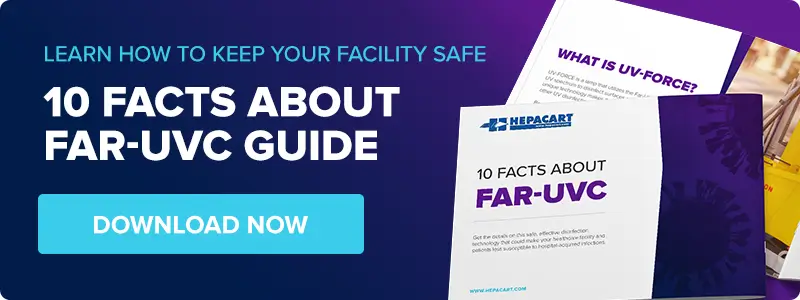In your home, you might consider something “clean” as long as it’s not covered in dust or grime. But in hospitals, food facilities, and other sensitive environments there is a lot more to cleaning than running a dust cloth over a surface.
Ultraviolet (UV) light has been used in disinfection practices around the world for years. Indeed, Arthur Downes and Thomas P. Blunt published a paper in 1878 describing the use of UV light on bacteria and the process has been used to disinfect drinking water since 1910.
Recent developments in technology have maximize the effectiveness and efficiency of UV sterilization, addressing some of the common problems found with older methods.
UV Disinfection: An Overview
UV disinfection, more officially known as ultraviolet germicidal irradiation, is hardly a new addition to the world of disinfection. In fact, using UV-C lights have been used for this purpose since the middle of the 20th century.
UV-C lamps work on a physical level. Microorganisms like bacteria and viruses are rendered inactive by UV-C lights because of the way the light damages the nucleic acids of the cells. UV-C light has short wavelengths and high energy, which microorganism RNA and DNA absorb and by which they are destroyed, left unable to infect.
The majority of UV disinfection that is currently in use leverages UV-C light, which, while effective, can present some dangers. For instance, UV-C light can penetrate the skin and cause harm to humans that are present during disinfection. In addition, UV-C light causes the rapid aging of materials like plastic and rubber, making it a risk to use in some environments where sensitive and expensive equipment may be subject to these effects.
How UV-FORCE is Different
UV-FORCE® technology is different from UV-C disinfection options because it utilizes a different wavelength of the UV light spectrum — far-UVC. Far-UVC light has a shorter wavelength and higher photon energy than UV-C, making its effect on microorganisms different from UV disinfection lamps that are most commonly used. Far-UVC light is able to cause physical destruction of viral, bacterial, and fungal cells in a matter of seconds, much faster than UV-C lamps.
Further, far-UVC light is safe for use when people are present, which is not true of UV-C lamps. UV-FORCE technology uses a wavelength of light that, according to the best available research, cannot penetrate the skin, protecting human cells.
According to a study published in early 2018:
"Far-UVC light (207–222 nm) efficiently inactivates bacteria without harm to exposed mammalian skin. This is because, due to its strong absorbance in biological materials, far-UVC light cannot penetrate even the outer (non living) layers of human skin or eye; however, because bacteria and viruses are of micrometer or smaller dimensions, far-UVC can penetrate and inactivate them."
UV-FORCE® technology does not use of mercury, which is included in the bulbs of many UV-C lamps. The construction of the UV-FORCE lamp means that it is safer both for use and for disposal than a similar UV-C lamp.
Where UV-FORCE Can Be Used
UV-FORCE technology has a wide range of applications. One of the most common uses of far-UV-C disinfection is in the treatment of water, since water can easily be circulated to maximize exposure to the light.
Of course, hospital construction and infection control represent an enormous opportunity for the use of UV-FORCE technology because both disinfection and time are so critical. Far-UVC disinfection means that entire rooms can be disinfected in a matter minutes while presenting no danger to staff.
This blog post is only the beginning of what is possible with far-UVC light and UV-FORCE technology. To learn more, download the offer below.

This post was updated in July 2018 to reflect the latest research and statistics.